Hello everyone, I hope you all are doing well and great. Today, I will be covering my topics for the first week of my course which was approved by
@siz-official. The topics which I will be covering today are:
- What is Intelligence?
- What is Artificial Intelligence?
- Weak vs Strong AI
- Foundations of AI
So, let's start by first understanding what is meant by intelligence and then diving further into the topics.
WHAT IS INTELLIGENCE?
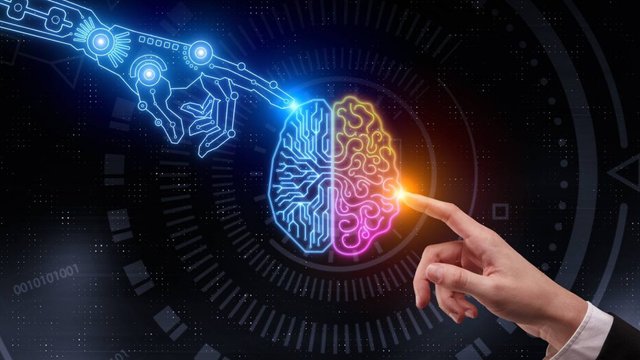
Source
It is a quality or an ability to do various different things by understanding them, learning from them, and even gaining experience from them. It is the ability to solve different problems we face in our lives, it is an ability by which we can reason about things. It also means to adapt to new situations based on the knowledge and experience we have. There are also various characteristics of intelligence, and some of them are listed below:
- It is the ability to solve simple and complex problems.
- It helps to think about a particular situation or a problem, then plan about it and execute it accordingly.
- It is the ability to memorize things.
- It is an ability to perceive things and understanding them.
- It is the ability to tackle many ambiguous and also fuzzy problems.
- It is the ability to learn from various experiences and to adapt to new situations.
Besides these characteristics, there are many more which can help us understand what intelligence is and how it helps in almost every aspect of our lives. However, intelligence is not only restricted to humans, as we see that with the evolution of technology, but many devices and machines also exhibit these behaviors and characteristics which gives the rise of the concept of Artificial Intelligence.
WHAT IS ARTIFICIAL INTELLIGENCE?
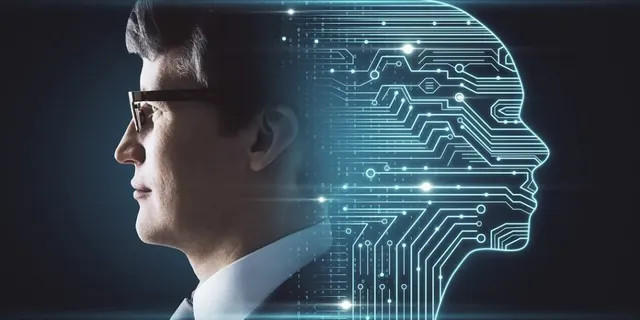
Source
Before giving definitions given by various experts, understand that AI is an unregulated term. What does it mean? It means that AI is not a specific thing, it keeps changing and evolving every now and then, and so its definition is also not fixed and it keeps changing too. Here are some of the definitions given by experts:
- The art of creating machines that perform functions that require intelligence when performed by people. -Kurzweil, 1990
- The study of how to make computers do things at which, at the moment, people are better. -Rich and Knight, 1991
- The study of the computations that make it possible to perceive, reason and act. -Winston, 1992
- The exciting new effort to make computers think... machines with minds, in the full and literal sense. -Haugeland, 1985
These are only an insight of the few definitions and interpretations, but we can agree on the fact that it is a domain where we try to make machines act and think in a humanly way, where we make it possible for the machines to think rationally and with reasoning. We want them to function and reason using almost the same intelligence as humans and accomplish tasks by doing so. AI can be viewed as a study of agents or such expert systems that have the ability to learn from experience and knowledge and then act on the information they learned, such systems can also have the ability to make inferences and deductions.
WEAK AI vs STRONG AI
There are many communities in this massive domain of AI, and all of them have different perspectives. The difference arises due to the fact that AI is continuously evolving and is not stagnant, it is changing every other day. But it has been divided into groups, namely Weak AI and Strong AI.
Narrow AI is also a word that is used for this. Weak AI means that it is capable to work only in a narrow domain which ultimately means that these are programmed to do a specific task or a function. It holds an area of a small subset and works only on that, it does not do anything other than what it is programmed to do. For example, Chatbots or Personal Assistants such as Siri, Google Assistant, Alexa, all are perfect examples to explain what a weak AI is. They are programmed with certain functions and can't do anything on their own i.e. they can only do what they've been programmed to do. Suppose, you say 'Turn on the music', now the algorithm understands this with the help of keywords such as "on" and "music", and the response of the program would turn on the music on your device. In other words, they can't think on their own, nor make new decisions on what you ask them to do. They are only focused on a limited set of functions and applications.
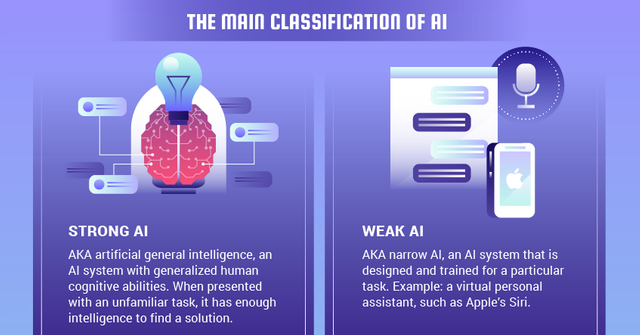
Source
It is also known as Artificial General Intelligence as it contains generic knowledge that can be applied to various areas and domains. Compared to Weak AI, Strong AI has a much more complex algorithm and unlike Weak AI, it is not programmed with specific functions. You can say that it has a mind of its own and it concurs that machines can somewhat develop the same consciousness as humans. The algorithm helps perform complex tasks which do not require human supervision or intervention and the outcome is always unpredictable as it has not been programmed with a specific result or an answer. It means that they have a mind similar to humans that can think, act, predict and reason using logic. It also has the power to learn from the knowledge and experience and make new decisions or rules, it acts independently and learns to adapt to different scenarios. They are considered as intelligent, while Weak AI which we know can not think on its own, is not considered intelligent since it can not think nor act like humans.
FOUNDATIONS OF AI
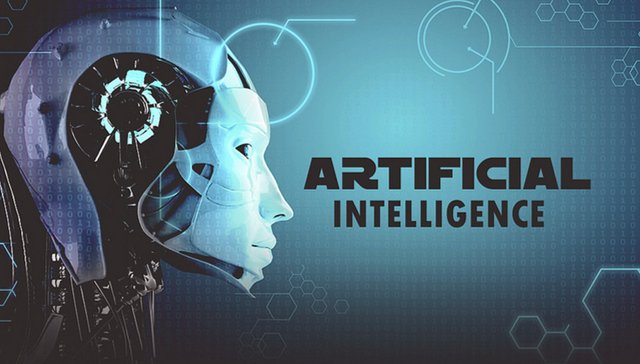
Source
We are often so focused on the few or prominent factors that have contributed to AI that we forget many other disciplines, subject areas, viewpoints, and many different ideas that have also contributed. The thought process has been going on for more than a thousand years and after the birth of modern computing, it has just gotten more evolved. Subject areas like Philosophy, Mathematics, Economics, Psychology, Neuroscience, Linguistics, Computer Science and Engineering, and many other areas have contributed to AI in their own way. They put forth different questions and later on they were resolved and proved that they helped to form the concept of intelligent machines and systems.
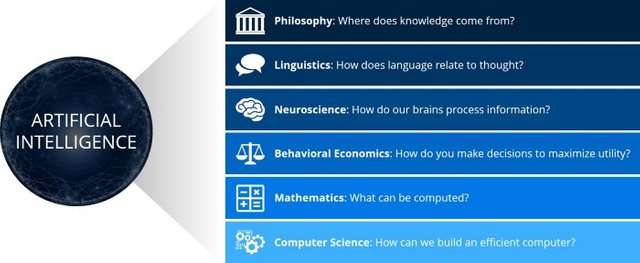
Source
The idea of Logic means to infer new information from the previous basic knowledge and Aristotle worked on this and gave a precise set of rules governing the rational part of the human brain, he gave the idea of Syllogisms. The idea itself was so firm and focused that many different mechanical machines including mechanical calculators were made which were able to deduce new information or conclusions. This led to the idea that machines might not only be able to calculate but might actually be able to think and act on their own.
Mathematics provided with the idea of probability and computation, it also helped in Proposition or Boolean Logic, which we know only have two values i.e. True and False. This powerful concept of logic is the fundamental basics on which the entire computing system is based (Binary Numbers: 0,1). Math also helped to understand that not every problem we face is solvable and some are so obvious that they don't require any proof.
Economics has helped us understand how to maximize the outcomes of certain things which gave rise to a new concept of rational agents which are programs or humans taking rational and meaningful decisions based on reasons and logic.
Neuroscience makes us ponder and wonder that how does the brain process information? What are neurons? Our brain has millions of interconnected neurons which are sending and receiving signals continuously, and the idea of neurons and nerve cells made the application of Artificial Neural Networks (ANNs) possible.
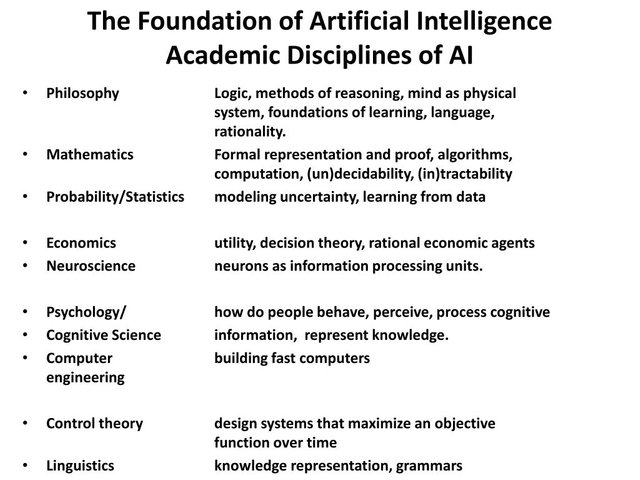
Source
Apart from these domains, there are many more research and subject areas that have contributed to the foundation of AI in some sense.
AI is a vast domain which itself is divided into many subdomains such as Machine Learning which is further divided into Deep Learning. It is continuously making changes and evolving constantly, it will continue to grow as more and more people will get to know about this.
I hope now you have an idea of what AI is, and what do we mean by Strong and Weak AI, this was my first lecture of the course "Introduction to Artificial Intelligence".






Good one Post dear friend you make a very good post thanks for sharing a good information with us my best wishes for you.
Regards, Faran Nabeel